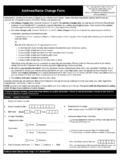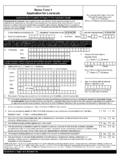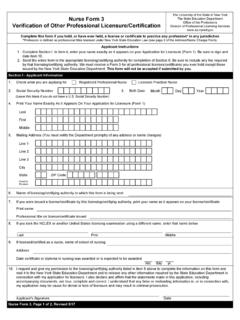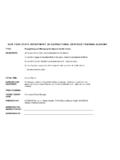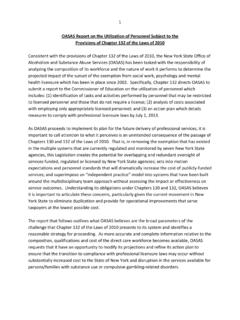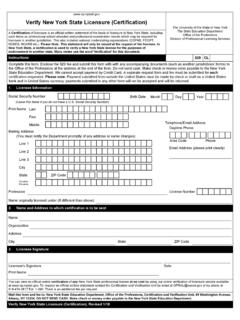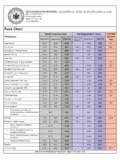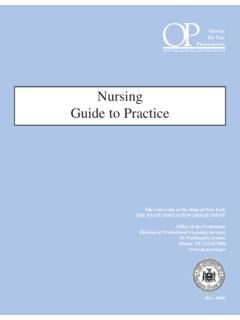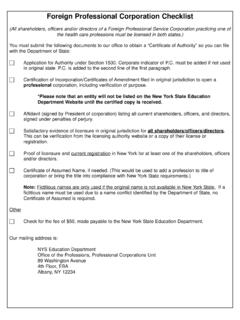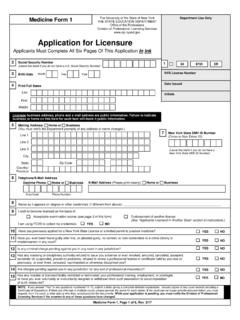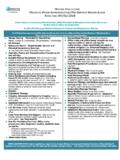Transcription of FOR DISCUSSION (Information, General) EXECUTIVE …
1 THE STATE EDUCATION DEPARTMENT / THE UNIVERSITY OF THE STATE OF NEW YORK / ALBANY, NY 12230 deputy COMMISSIONER FOR THE professions Office of the professions Phone: (518) 474-3862 Fax : (518) 473-2056 May 19, 2000 FOR DISCUSSION (Information, General) TO: The Honorable the Members of the Board of Regents Committee on Professional Practice SUBJECT: Continuing Competence EXECUTIVE SUMMARY This report on continuing competence is the fourth in a series of informational reports on major emerging issues in professional regulation. Our previous emerging issues policy discussions included corporate practice, cross-jurisdictional licensure, and telepractice. These horizon issues have been identified by the Regents, the Department and the professional community as important regulatory and policy issues that are essential to the future of quality professional practice and public protection.
2 The Board of Regents has used reports such as these, and events such as the Regents Conference on the professions and the Regents Legislative Conference, to consistently identify best practices and strategies to actively shape the development of professional practice and regulation in New York State. These and other horizon issues will form the basis for the next Regents Conference on the professions , Professional Regulation in the 21st Century, on October 3, 2000. This report provides an overview of the cutting-edge issues related to continuing competence, the challenges professionals and regulators face nationwide in addressing this important area and a description of actions the Office of the professions has taken to promote the continued competence of licensed professionals in our State. WHAT IS PROFESSIONAL CONTINUING COMPETENCY? In its simplest form, continuing professional competence means that a licensee: 1) is at least as qualified to practice as at the time of licensure, and 2) has kept current with changes and developments in the profession since the time of licensure.
3 However, virtually nothing in professional practice is as simple as this. In fact, many professionals specialize over their careers and develop advanced expertise while "dropping" some entry-level competencies. According to one nursing licensee, for example, "after 10 years of specializing in the care of adult patients in coronary care, I developed much high level expertise in this aspect of nursing. However, I was no longer as competent as a new licensee to care for newborns." Although regulators in the United States and other countries have been considering the issue since at least the early 1970 s, neither they nor the professional community have agreed on the best way to ensure continuing competence. BACKGROUND Continuing professional competence is an important component of the public protection equation that also includes: licensure of qualified individuals; public education; and swift professional discipline when necessary.
4 Competence is not specifically defined in New York State Education Law. Rather it is illuminated by multiple factors including disciplinary definitions and requirements for training and experience for specialized certifications. Section 6503 of the Education Law defines practice of a profession and states, admission to the practice of a profession subjects the licensee to the procedures and penalties for professional misconduct. Part 29 of the Rules of the Board of Regents further defines unprofessional practice, which can subject a licensee to charges of professional misconduct. In addition, other sections of law, rules and regulations are aimed at promoting competence in certain general areas. For example, Sections 6507-3 and 6505-b of Education Law require specialized training in child abuse identification and reporting and infection control and barrier precautions. Professionals work in a world of evolving technology, research advancements, expanding scopes of practice, increased consumer expectations and other emerging issues.
5 Practice in this changing environment requires ongoing development of knowledge and skills. As the professional practice arena develops and expands, the Office of the professions , as the administrative arm to the Regents, actively supports professionals in maintaining their competence over time. QUALIFICATIONS AT INITIAL LICENSURE A New York professional license indicates that the Board of Regents and the Education Department, with the assistance of the State Boards for the professions , has determined that an individual has met the requirements to enter practice of the profession in this State. The Regents and the Department contribute to the establishment of high standards by reviewing professional program curriculum and quality. As years pass and professions evolve, professionals are expected to maintain a high standard of practice and competency. The level of knowledge needed in today s professional marketplace, however, is increasing.
6 To cite one illustration of this: in the late 1960 s there were only about 600 commercially available drugs; today there are some 9,000 prescription drugs 2 and with over-the-counter drugs that number jumps to about 13,000 commercial products available today. Not only is it necessary to remain current with all the new drugs, but along with those new products come a variety of side effects that practitioners must also know to ensure patient safety. It is, therefore, significantly more challenging to maintain professional competence today than it was 40 years ago. In all professions , the explosion of information and available technology creates similar challenges for the licensee and underscores the importance of the continuum of professional practice. EDUCATING THE PUBLIC TO PREVENT PROFESSIONAL MISCONDUCT As important as it is to discipline incompetent professionals, it is equally important to actively promote sound practice.
7 While professional discipline plays an important role in ensuring competence, it occurs after the fact. Career-long education, training, and assessment of competence help to prevent professional misconduct before it occurs and contribute to safe professional practice. Sound professional practice also reduces complaints and the need for costly and time consuming misconduct investigations and prosecutions. Our extensive public information campaign to consumers supports continuing competence indirectly by giving them the information they need to shop smart for professional services. As professional practice continues to evolve and expand, consumers, professionals and regulators must receive competent professional services. GENERAL APPROACHES TO CONTINUING COMPETENCE A wide variety of strategies are being considered by professional regulatory bodies around the world in efforts to assure career-long professional competence.
8 On the national level, groups such as the Pew Health Commission, the Citizen Advocacy Center, and the National Committee on Quality Assurance are highlighting the importance of continuing competence. In its October 1998 report, the Pew Health Commission s Taskforce on Healthcare Workforce Regulation recommended that all healthcare professionals be required to meet specific competency requirements throughout their careers. Concerns about continuing professional competence are at the core of several recommendations of the 1999 Report of the Institute of Medicine, "To Err is Human: Building a Safer Health Care System." This report, which has attracted widespread attention to medical and prescription errors, recommends a variety of approaches to increasing patient safety including increased education and dissemination of information, re-examination and re-licensure. There is no general agreement on which strategies are most effective; each has its pros, cons and unknowns.
9 This report will look at six of these generally accepted strategies: Periodic re-examination Mandatory continuing education Educational outreach Peer review of on-site performance or portfolios 3 Self-assessment National standards of professional competence Periodic Re-Examination Just as applicants for licensure must pass a licensing examination, some have proposed that professionals be subject to periodic re-examination. New York State Podiatry, Medicine and Pharmacy Board members are considering requiring successful completion of the entry-level licensing exam for individuals seeking restoration of their professional licenses. This has already occurred in some cases, especially when the time period between revocation and restoration of the license is lengthy. Routine, periodic re-examination of current licensees does not occur at this time in our State.
10 Periodic re-examination was recommended in 1967 by the Bureau of Health Manpower (US Department of Health) for licensure of physicians. In 1971, however, the Bureau shifted the responsibility for ensuring competence to state professional associations. Considerations: Periodic Re-examination Many professionals oppose re-examination, including the American Dental Association and National Association of Boards of Pharmacy 58% of pharmacists surveyed said testing is not a valid measure for determining continuing competence. Some opponents register concern about what type of exam to offer. Should an exam that is appropriate for determining the minimum competency of a novice practitioner be the vehicle for assessing the continuing competence of a seasoned professional? Opponents also cite the logistics of administering a mid-career exam to licensees who are scattered about the globe. Mandatory Continuing Education (MCE) A surge of interest in mandatory continuing education (MCE) in the 1960's may have been spawned by the desire of professions for a more acceptable requirement than re-examination.
